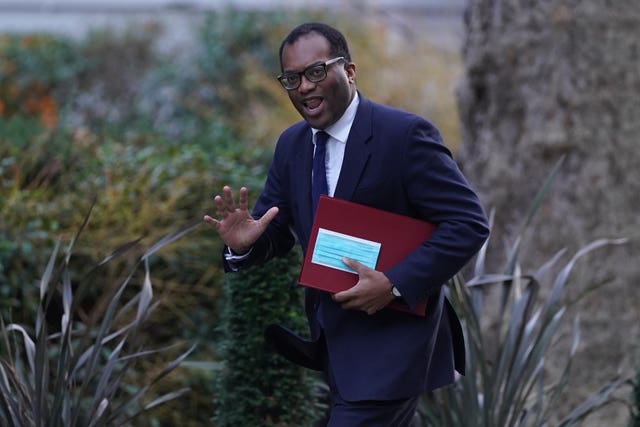
Tonight with Andrew Marr 6pm - 7pm
7 April 2022, 11:04

The Scottish Government is firmly opposed to such developments.
The UK Government has no plans to “impose” new nuclear power stations on Scotland as part of its energy strategy, the Business Secretary has said.
Speaking as the document was published, Kwasi Kwarteng acknowledged control over the issue lies with Holyrood – where Nicola Sturgeon’s Government is firmly opposed to nuclear developments.
The long-awaited energy strategy includes plans for eight reactors – the equivalent of one a year – to be delivered by the end of this decade.
The move is seen by the UK Government as part of a drive for “cleaner and more affordable energy”, with the aim of 95% of electricity coming from low-carbon sources by 2030.
Mr Kwarteng told BBC Radio Scotland Good’s Morning Scotland programme the UK Government is planning new nuclear reactors across England and Wales, saying there is “huge appetite” for this “particularly in Wales”.
But he added: “We have no plans to impose nuclear reactors in Scotland.
“It is a devolved affair, that is up to people in Edinburgh to decide what their nuclear policy is.”
His comments came as the Scottish Government’s Energy Secretary, Michael Matheson, insisted: “Our position is very clear on nuclear, we don’t believe nuclear needs to be part of future energy mix here in Scotland and we have got no intention of taking forward nuclear developments.”
Scotland currently has only one nuclear power station, the Torness plant in East Lothian, after the Hunterston B site in North Ayrshire closed in January.
Mr Kwarteng said UK ministers believe “the only way you can get decarbonised baseloads – continuous power that is decarbonised – is nuclear”.
He added: “I don’t know what the answer is the Scottish Government has to that question, but we are very clear that nuclear power has to be an important part of a decarbonised energy mix in the future.”

Mr Matheson said the Scottish Government is opposed to new nuclear power stations on environmental grounds, due to safety concerns and because “it is probably the most expensive form of electricity you can choose to produce”.
Speaking on BBC Radio Scotland, Mr Matheson said: “It’s a very expensive form of electricity to produce because it has to be heavily subsidised by the taxpayer.
“My concern is if the UK Government are so wedded to developing further nuclear sites, not only is there environmental risk associated with that but it is likely to drive up the costs of people’s household bills.
“Renewables are actually much, much cheaper and dropping in price and will help to lower people’s bills instead.
“If the objective is to reduce energy prices, we need to move much more quickly towards renewables and energy efficiency, including reducing demand though greater insulation programmes on domestic premises.
“Those are the ways you can help reduce energy costs and also meet our net-zero objectives.”

He also accused the UK Government of failing to engage with Scottish ministers in the development of its new energy strategy.
Mr Matheson said: “The UK Government haven’t provided a copy of the strategy to the Scottish Government, and they haven’t engaged with us in the development of the strategy.”
He said that was despite the Scottish Government writing to Westminster last month “setting out a range of actions we believe they should take” and the importance of Scotland to the UK’s energy supply, as a source of both renewable power and North Sea oil and gas.
The Energy Secretary insisted: “It was critical that the Scottish Government were involved in the shaping of any strategy and consulted on its content.
“Sadly none of that has happened, which is completely unacceptable given Scotland is a net exporter of energy to other parts of the UK and will become even more important as we move to becoming a net-zero society.”
However Mr Kwarteng said there had been “quite a lot of engagement with Scottish colleagues”, adding he is “disappointed Mr Matheson has said what he has said”.
He said: “We have always engaged with colleagues in Scotland on the net-zero strategy, again on the hydrogen strategy, and we have plenty of conversations with Scottish colleagues in the run-up to this strategy.”